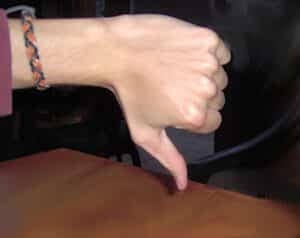Behavior, a Big Word | Childhood Obesity News

One problem with people is: Often it is not that difficult to put a finger on What Is Wrong, but sometimes people want to take a deep dive into the cesspit and spend a monumental amount of energy, endlessly elaborating on what is wrong.
Another way to do things would be like Abraham Maslow. Study the people who are doing well, and figure out which of their traits might be transmissible. Traits are expressed by behavior, so concentrate on behaviors that can be taught and learned. Then, devise a way to get people to want to learn them.
It covers a lot of ground
Just as our diet basically means everything we eat, our behavior basically means anything we do. It encompasses all of human nature. There has been a lot of talk, probably ever since people could talk, about how much anyone ought to take it upon themselves, or be empowered, to interfere with other people’s behavior.
Imagine a very basic society, confronted by a member who will neither hunt nor gather. Life was rough for everyone, and a person who refused to fulfill the most obvious societal obligations might very well be ostracized. Snubbed, shunned, excluded, avoided, rejected, shut out, expelled. Even though they did not possess the brains we have today, early humans probably thought, “When this perfectly capable person refuses to help himself, the rest of us suffer for it. We don’t need the aggro. We’re letting him go.”
The pain of largeness
And what does ostracize itself mean? To leave a person out of conversations, friendships, groups, privileges, rights, comfort… which is what, in our society, often happens to obese people. The younger ones are especially vulnerable to ostracism, not having other means to compensate for the social handicap of being too big. They get left out and pushed out. It is a variation of the ancient scenario in the previous paragraph. Even though we are now very advanced, it inspires a similar thought. “If someone with excessive fat does not care enough to help himself, it weakens and endangers all of us.”
Then, we rationalize our distaste by listing all the different ways in which uncontrolled obesity statistics will mean the end of civilization, or an equally dire outcome. One expert sees things differently. In the pages of his book, Overweight: What Kids Say, Dr. Pretlow refers again and again to the depression, unhappiness and misery of children and teens who are stuck in a bad situation and don’t know how to get out. His personal empathy and compassion are obvious. The work leaves the reader feeling that helping obese young people to thrive is an ambition both worthy and doable. If we take care of these kids, civilization will have an easier time taking care of itself.
Your responses and feedback are welcome!
Source: “Abraham Maslow, His Theory & Contribution to Psychology,” PositivePsychology.com/ 09/29/17
Image by Sandra Cohen-Rose and Colin Rose/CC BY 2.0








